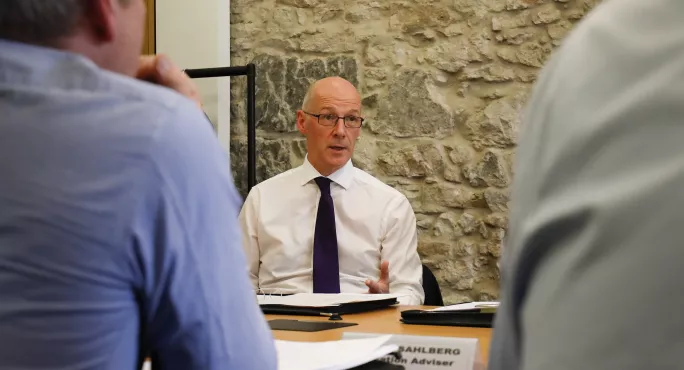- Home
- John Swinney: ‘I will listen to teachers’ worries’
John Swinney: ‘I will listen to teachers’ worries’

I would like to begin my update this month by directly addressing what is the hottest topic in education across the country: pay for teachers.
I am in no doubt from my meetings with teachers about the strength of feeling over the current pay negotiations. I also know every public-sector worker has experienced pay restraint over recent years. From the very start, we have been clear with the teaching unions that we want to deliver a strong deal for teachers, but it must also be affordable.
The Scottish government has worked with [local authorities body] Cosla to put in place the best pay deal for teachers in the UK for 2018-19. It is a deal which we believe is strong and fair. The offer on the table has been subject to some misinterpretation, so I would like to take this opportunity to clarify some of the key points.
Teachers are not being offered less than their public-service counterparts. The pay award for the majority of health workers is 9 per cent over three years (3 per cent per year) and the recent award for police officers is a one-off 6.5 per cent increase covering September 2018 to April 2021. So our offer to teachers - for one year - compares very favourably.
Adding in additional funding to restructure the main-grade scale and annual progression, the majority of teachers will receive a rise between 5 per cent and 11 per cent. Probationer teachers will now start on £24,948, making the profession more attractive, and a fully registered teacher entering the profession will be paid £29,936, which compares favourably with other graduate professions.
Only teaching representatives can accept this offer on behalf of their members. I, therefore, would urge all those involved to give it serious consideration as we encourage representatives to return to the negotiating table.
Career progression within the profession is also an issue which has been raised repeatedly. I know teachers have voiced concerns about opportunities to develop and advance in their career. That is why I have asked Moyra Boland to chair the Independent Panel on Career Pathways. The panel has undertaken a series of consultation engagements across the country and an online survey, which has already received more than 3,700 responses.
This work is essential to provide greater opportunities for teachers to develop and progress into new and different roles. While pay is, of course, important, teachers have also told me that it is only one factor in career fulfilment.
Cutting teacher workload
There is absolutely no shortage of talent or ability among the teaching workforce in Scotland, but there is a need to identify, encourage and support those who are interested in rising to the challenge of the headteacher role. That is why we have worked with a range of partners to agree actions to collectively promote headship as a rewarding and attractive career and better help those teachers who are willing to take on a leadership role. These recommendations have recently been published on the Scottish government website, many of them aimed at improving support through coaching and development programmes or through the sharing of best practice.
I would urge anyone interested in progressing their teaching career to discuss this with their school leaders to help identify suitable next steps.
Other than pay and career progression, the other main area where we continue to try and identify where improvements can be made to improve the average working day is in tackling workload. Nobody joins the profession for the love of bureaucracy; that is why we continue to do all we can to free up teachers to teach.
Just recently I announced that “Recognising Positive Achievement” - the automatic fallback to National 4 for young people who are unsuccessful at National 5 level - will end from the academic year 2019-20.
This change will reduce workload for young people and teachers alike, removing duplication of effort and ensuring that learners are presented for the correct level of qualification.
Although we continuously aim to identify and implement improvements to pay and workload, I know there is still more to be done to ensure teaching remains an attractive career option. Dedicated and passionate teachers are the greatest resource our education system has, and local and central government hugely values the difficult work they do.
That is why we are taking action to reform the very heart of the education system, put in place additional support for teachers and tackle workload wherever possible. It is teachers and headteachers who are leading the changes in our classrooms. You are the ones with the knowledge and experience to make a real difference. And it is our children who will benefit in the long run.
I reiterate the commitment I made on the day I was appointed - I will listen to the profession about their concerns, their achievements and accomplishments - and their suggestions for how things can improve.
And I will continue to do what I can to drive forward real and noticeable change to the daily lives of all our teachers across Scotland.
John Swinney is Scotland’s education secretary and deputy first minister
Keep reading for just £1 per month
You've reached your limit of free articles this month. Subscribe for £1 per month for three months and get:
- Unlimited access to all Tes magazine content
- Exclusive subscriber-only stories
- Award-winning email newsletters



